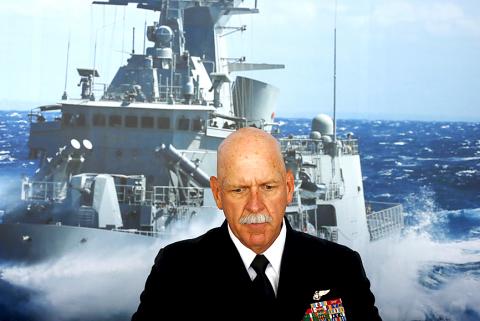The US Pacific Fleet commander has warned of a possible arms race in the disputed South China Sea which could engulf the region, as nations become increasingly tempted to use military force to settle territorial spats instead of international law.
US Navy Commander Admiral Scott Swift urged nations, such as China, to seek arbitration to settle maritime disputes.
“My concern is that after many decades of peace and prosperity, we may be seeing the leading edge of a return of ‘might makes it right’ to the region,” Swift said on Monday in a speech in Hawaii, according to a copy seen by reporters.

Photo: Reuters
“Claimants and non-claimants alike are transferring larger shares of national wealth to develop more capable naval forces beyond what is needed merely for self-defense,” Swift said.
Asked about Swift’s comments, Chinese Ministry of Foreign Affairs spokesman Hong Lei (洪磊) said: “Certain countries are exaggerating tensions in the South China Sea region, which is in reality to create confusion and meddle in the South China Sea. China is resolutely opposed to this.”
China’s Ministry of National Defense said certain countries were conducting “a big show of force” in the South China Sea.
“At the same time, [they are] wantonly expressing remarks to create tensions, in an attempt to sow confusion and muddy the waters,” the ministry said in a faxed statement.
China claims most of the South China Sea, through which more than US$5 trillion of world trade ships every year. Taiwan, the Philippines, Vietnam, Malaysia and Brunei also claim parts of the sea.
Beijing is building seven man-made islands on reefs in the Spratly Islands (Nansha Islands, 南沙群島), including a 3km long airstrip on one of the sites, according to satellite imagery of the area.
“Even now, ships and aircraft operating nearby these features, in accordance with international law are subject to superfluous warnings that threaten routine commercial and military operations,” Swift said, speaking at the Cooperative Strategy Forum to naval commanders from Japan, the Philippines, Indonesia and other countries.
A Chinese naval fleet is currently visiting Hawaii, including a destroyer and a frigate, according to defense ministry.
In October, a US guided missile destroyer sailed close to one of China’s artificial islands, drawing an angry rebuke from Beijing and a shadowing patrol.

MAKING WAVES: China’s maritime militia could become a nontraditional threat in war, clogging up shipping lanes to prevent US or Japanese intervention, a report said About 1,900 Chinese ships flying flags of convenience and fishing vessels that participated in China’s military exercises around Taiwan last month and in January last year have been listed for monitoring, Coast Guard Administration (CGA) Deputy Director-General Hsieh Ching-chin (謝慶欽) said yesterday. Following amendments to the Commercial Port Act (商港法) and the Law of Ships (船舶法) last month, the CGA can designate possible berthing areas or deny ports of call for vessels suspected of loitering around areas where undersea cables can be accessed, Oceans Affairs Council Minister Kuan Bi-ling (管碧玲) said. The list of suspected ships, originally 300, had risen to about

DAREDEVIL: Honnold said it had always been a dream of his to climb Taipei 101, while a Netflix producer said the skyscraper was ‘a real icon of this country’ US climber Alex Honnold yesterday took on Taiwan’s tallest building, becoming the first person to scale Taipei 101 without a rope, harness or safety net. Hundreds of spectators gathered at the base of the 101-story skyscraper to watch Honnold, 40, embark on his daredevil feat, which was also broadcast live on Netflix. Dressed in a red T-shirt and yellow custom-made climbing shoes, Honnold swiftly moved up the southeast face of the glass and steel building. At one point, he stepped onto a platform midway up to wave down at fans and onlookers who were taking photos. People watching from inside

Japan’s strategic alliance with the US would collapse if Tokyo were to turn away from a conflict in Taiwan, Japanese Prime Minister Sanae Takaichi said yesterday, but distanced herself from previous comments that suggested a possible military response in such an event. Takaichi expressed her latest views on a nationally broadcast TV program late on Monday, where an opposition party leader criticized her for igniting tensions with China with the earlier remarks. Ties between Japan and China have sunk to the worst level in years after Takaichi said in November that a hypothetical Chinese attack on Taiwan could bring about a Japanese

STREAMLINED: The dedicated funding would allow the US to transfer equipment to Taiwan when needed and order upgraded replacements for stockpiles, a source said The US House of Representatives on Thursday passed a defense appropriations bill totaling US$838.7 billion, of which US$1 billion is to be allocated to reinforcing security cooperation with Taiwan and US$150 million to replace defense articles provided to the nation. These are part of the Consolidated Appropriation Act, which the US House yesterday passed with 341 votes in favor and 88 against. The act must be passed by the US Senate before Friday next week to avoid another government shutdown. The US House Committee on Appropriations on Monday unveiled the act, saying that it allocates US$1 billion for the Taiwan Security Cooperation Initiative